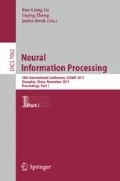Abstract
Most population based evolutionary algorithms (EAs) have struggled to accurately predict structure for long protein sequences. This is because conventional operators, i.e., crossover and mutation, cannot satisfy constraints (e.g., connected chain and self-avoiding-walk) of the complex combinatorial multi-modal problem, protein structure prediction (PSP). In this paper, we present novel crossover and mutation operators based on conflict resolution for handling long protein sequences in PSP using lattice models. To our knowledge, this is a pioneering work to address the PSP limitations for long sequences. Experiments carried out with long PDB sequences show the effectiveness of the proposed method.
Access this chapter
Tax calculation will be finalised at checkout
Purchases are for personal use only
Preview
Unable to display preview. Download preview PDF.
References
Anfinsen, C.B.: Principles that govern the folding of protein chains. Science 181, 223–230 (1973)
Cutello, V., et al.: An immune algorithm for protein structure prediction on lattice models. IEEE Trans. Evol. Comput. 11(1), 101–117 (2007)
De Jong, K.A.: Analysis of the behavior of a class of genetic adaptive systems. Ph.D. thesis (1975)
Dill, K.A.: Theory for the folding and stability of globular proteins. Biochemistry 24, 1501–1509 (1985)
Dotu, I., et al.: On lattice protein structure prediction revisited. IEEE/ACM Trans. on Comput. Biology and Bioinformatics 99 (2011)
Helles, G.: A comparative study of the reported performance of ab initio protein structure prediction algorithms. J. Roy. Soci. Inter. 5(21), 387–396 (2008)
Holland, J.H.: Adaptation in natural and artificial systems. The University of Michigan Press (1975)
Hoque, M. T., Chetty, M., Sattar, A.: Genetic Algorithm inAb Initio Protein Structure Prediction Using Low Resolution Model: A Review. In: Sidhu, A.S., Dillon, T.S. (eds.) Biomedical Data and Applications. Studies in Computational Intelligence, vol. 224, pp. 317–342. Springer, Heidelberg (2009)
Hoque, M., et al.: Non-Isomorphic Coding in Lattice Model and its Impact for Protein Folding Prediction Using Genetic Algorithm. In: IEEE CIBCB 2006, pp. 1–8 (2006)
Islam, M. K., Chetty, M.: Novel Memetic Algorithm for Protein Structure Prediction. In: Nicholson, A., Li, X. (eds.) AI 2009. LNCS, vol. 5866, pp. 412–421. Springer, Heidelberg (2009)
Islam, M.K., et al.: Clustered memetic algorithm for protein structure prediction. In: IEEE Con. on Evo. Compu. 2010, pp. 1–8 (2010)
Islam, M.K., et al.: Novel local improvement techniques in clustered memetic algorithm for protein structure prediction. In: IEEE Cong. on Evo. Compu. 2011, pp. 1003–1011 (2011)
Jones, T.: Crossover, macromutationand, and population-based search. In: Proc. of the 6th Int. Conf. on Genetic Algorithms, pp. 73–80 (1995)
Larraañaga, P., et al.: Estimation of Distribution Algorithms: A New Tool for Evolutionary Computation. Kluwer Academic Publishers, USA (2001)
Lesh, N., et al.: A complete and effective move set for simplified protein folding. In: Proc. of the 7th Ann. Inter. Conf. on Res. in Comp. Mol. Bio., pp. 188–195. ACM, NY (2003)
Mahfoud, S.W.: Niching methods for genetic algorithms. Ph.D. thesis, University of Illinois at Urbana-Champaign, Champaign, IL, USA (1995)
Santana, R., et al.: A markov chain analysis on simple genetic algorithms. IEEE Trans. Evol. Comput. 12(4), 418–438 (2008)
Shmygelska, A., et al.: An ant colony optimisation algorithm for the 2d and 3d hydrophobic polar protein folding problem. BMC Bioinfo. 6(30) (2005)
Spears, W.M., et al.: Crossover or mutation? In: Found. of Gen. Algo., vol. 2, pp. 221–237. Morgan Kaufmann (1992)
Thachuk, C., et al.: A replica exchange monte carlo algorithm for protein folding in the hp model. BMC Bioinfo. 8(342) (2007)
Zhao, X.: Advances on protein folding simulations based on the lattice hp models with natural computing. App. Soft Comp. 8(2), 1029–1040 (2008)
Author information
Authors and Affiliations
Editor information
Editors and Affiliations
Rights and permissions
Copyright information
© 2011 Springer-Verlag Berlin Heidelberg
About this paper
Cite this paper
Islam, M.K., Chetty, M., Murshed, M. (2011). Conflict Resolution Based Global Search Operators for Long Protein Structures Prediction. In: Lu, BL., Zhang, L., Kwok, J. (eds) Neural Information Processing. ICONIP 2011. Lecture Notes in Computer Science, vol 7062. Springer, Berlin, Heidelberg. https://doi.org/10.1007/978-3-642-24955-6_75
Download citation
DOI: https://doi.org/10.1007/978-3-642-24955-6_75
Publisher Name: Springer, Berlin, Heidelberg
Print ISBN: 978-3-642-24954-9
Online ISBN: 978-3-642-24955-6
eBook Packages: Computer ScienceComputer Science (R0)

